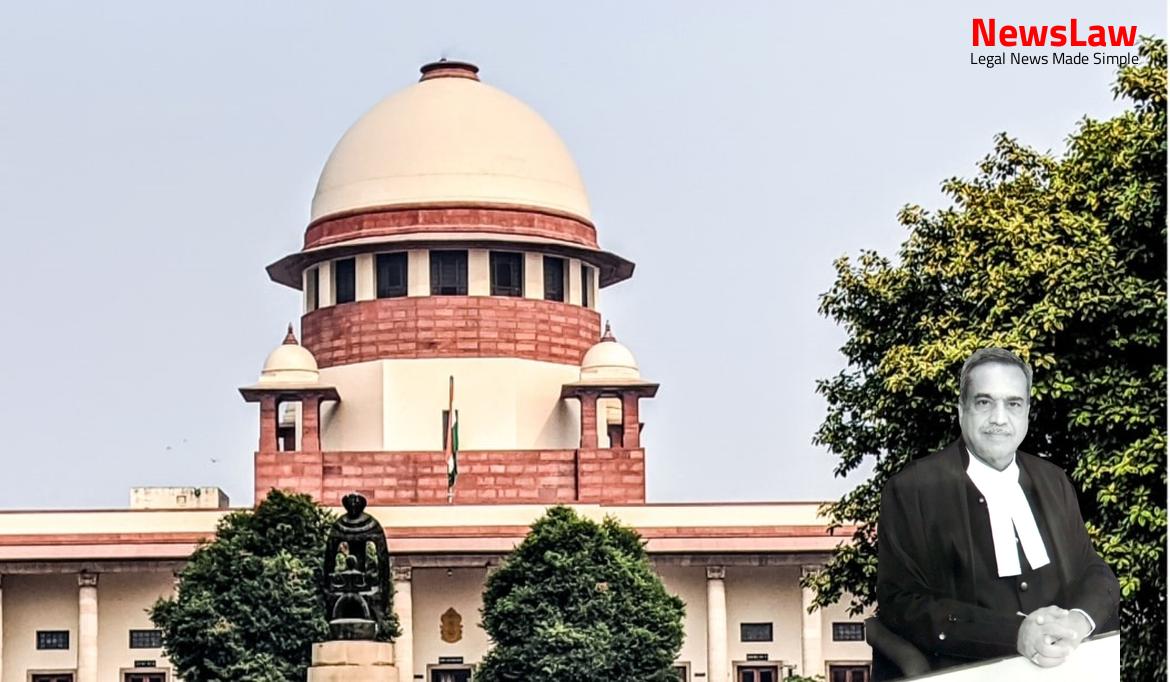The court’s thorough analysis of territorial jurisdiction in an arbitration transfer petition sheds light on the complexities involved in legal proceedings. Jurisdictional issues play a crucial role in determining the appropriate court for resolving disputes and upholding the principles of justice. Stay tuned to unravel the insights provided by the court’s legal analysis in this intriguing case.
Facts
- The Petitioner has filed a Transfer Petition seeking the transfer of Comm. A. S. No.09/2019 filed by Respondent No.1 under Section 34 of the Arbitration and Conciliation Act, 1996 before the CCH83 LXXII Addl. City Civil and Sessions Judge at Bengaluru, Karnataka to the Hon’ble Bombay High Court or any other court of competent jurisdiction in Mumbai, Maharashtra.
- The reason for the transfer petition is the Petitioner having filed Arbitration Petition No.416 of 2019 before the Hon’ble Bombay High Court under Sections 47 and 48 of the Act for the enforcement of an arbitral award dated 27 September, 2018 passed by the Arbitral Tribunal in ICC International Court of Arbitration Case No.19933/TO in London under the ICC Rules 2012.
- Learned counsel for the Petitioner argued the principle of exclusive jurisdiction.
Also Read: Analysis of Financial Statements as Acknowledgment in Limitation Act Case
Issue
- Primary issue is the consideration of territorial jurisdiction under Section 25 of CPC
- The Court needs to determine whether the plea of territorial jurisdiction can be entertained in this jurisdiction
- Understanding the significance of territorial jurisdiction in the current case
Also Read: Interpretation of Corporate Guarantor under IBC
Arguments
- The Petitioner argued for determining the jurisdiction of the cases filed in the subject proceedings to avoid conflicting findings by two courts.
- It was highlighted that holding proceedings in Mumbai would not prejudice the Respondent as its head office and promoter are based there.
- The Seat of arbitration was in London, and Sudanese law was to be applied, excluding the application of Part I of the Act.
- As a result, the Respondent is not entitled to file a petition under Section 34 of the Act in Bangalore or elsewhere.
- Even if Indian courts hold jurisdiction, Bangalore Principal City Civil Court does not have jurisdiction to entertain an award from International Commercial Arbitration.
- The jurisdiction should lie with the High Court according to submissions.
- The Respondent’s counsel argued that the lack of jurisdiction of the Bengaluru Court cannot be addressed in the transfer petition to this Court.
- It was pointed out that the areas of operation of petitions under Section 34 and Sections 47/48 of the Act are distinct.
- Reference was made to the order dated 2 August 2021 in a similar case titled ‘Naivedya Associates v. Kirti Nutrients Limited’ for context.
- Mere convenience of the party is not a valid ground for exercising the power of transfer under Section 25 of the Code of Civil Procedure, 1908.
- The Arbitration Act is considered a self-contained code for arbitration, and relief cannot be sought under the provisions of the CPC, especially Section 25 in this case.
- The argument put forth by the Petitioner concerning the commonality of issues between the two proceedings lacks foundation.
Also Read: Quashing of FIR and Charge-sheet: Legal Analysis
Analysis
- The principle of res judicata can be applied in this case to avoid multiplicity of views arising out of the same agreement between the same parties.
- This principle is crucial in maintaining finality and certainty in legal decisions.
- By applying res judicata, the court can prevent the same parties from litigating the same dispute multiple times, thereby promoting judicial efficiency.
- In this context, the agreement between the parties has already been adjudicated upon and should not be relitigated.
- The Court in which the suit is instituted must determine territorial jurisdiction
- Scope for questioning territorial jurisdiction should be raised before the Court where the suit is pending
- The plea for transfer of a suit invoking Section 25 of the Code of Civil Procedure was declined
- Limited scope vested in the Court under Section 25 of CPC
- Court cannot determine territorial jurisdiction of the proceedings
- Plea of jurisdiction cannot be extended for transfer of the case
- Main argument of the Petitioner lacks merit
- Other arguments raised are also lacking substance for transferring the case
Decision
- Transfer petition filed by the Petitioner lacks merit
- The transfer petition is dismissed
- Parties can prompt the issue before the Court where proceedings are pending
Case Title: NEILAN INTERNATIONAL CO. LTD. Vs. POWERICA LIMITED (2022 INSC 660)
Case Number: T.P.(C) No.-000032 / 2020



